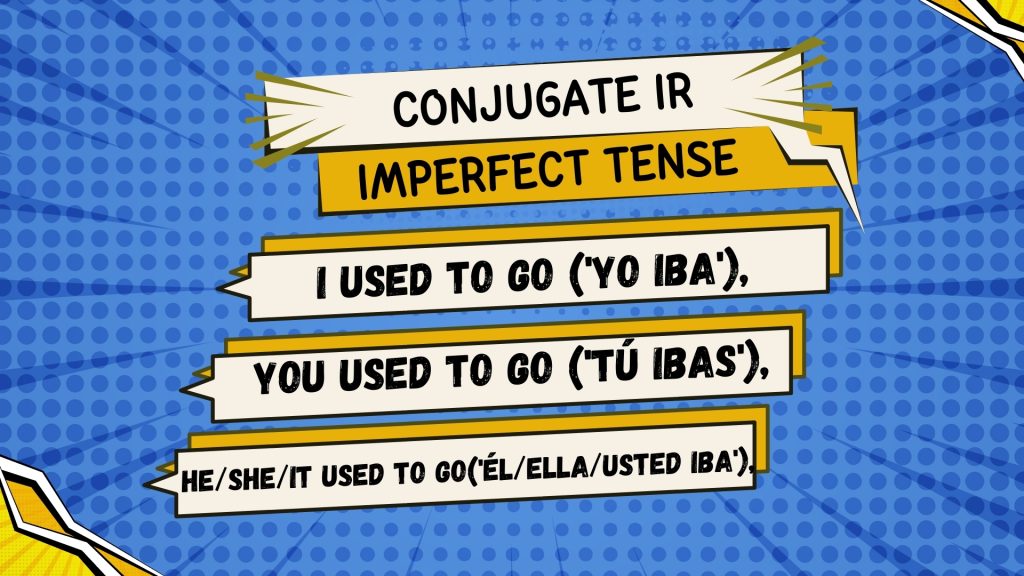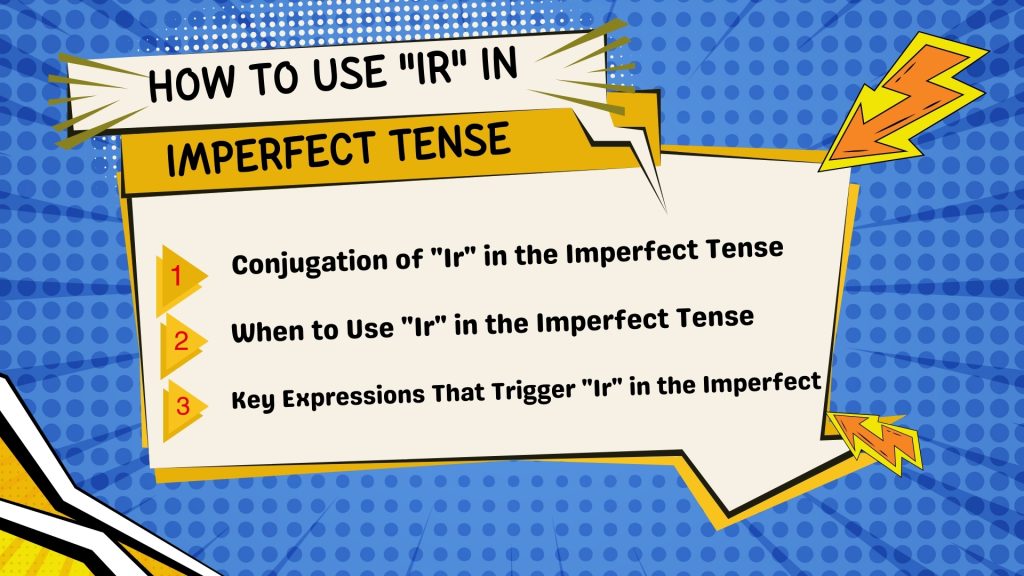The Imperfect tense in Spanish really brings past experiences to life. Unlike the Preterite tense, which wraps things up quickly, the Imperfect shows us ongoing or repeated actions in the past. It’s like watching an old movie that keeps playing.
Though it might not get as much attention as other tenses, it’s crucial for telling stories and describing past habits. But there’s more to it than just setting a scene or telling a story. Understanding the Imperfect tense can really deepen your knowledge of Spanish and help you appreciate how beautifully it captures past moments.
So, why not dive a bit deeper into this tense and see what new insights you can find?
What is the Imperfect Tense in Spanish?
The imperfect tense in Spanish helps describe things that happened regularly in the past or events that were ongoing.
It’s really useful for showing how things used to be over time, which helps make stories and history feel more alive and real.
This tense lets us see patterns in how people lived and how events unfolded, making it easier to get a full picture of past lives and actions.
Conjugate Ir Imperfect Tense
Let’s dive a bit deeper into the imperfect tense, focusing on the irregular verb ‘ir’.

Here’s how it breaks down:
- I used to go (‘yo iba’),
- you used to go (‘tú ibas’),
- he/she/it used to go (‘él/ella/usted iba’),
- we used to go (‘nosotros/nosotras íbamos’),
- you all used to go (‘vosotros/vosotras ibais’),
- they used to go (‘ellos/ellas/ustedes iban’).
Notice how these forms don’t follow the usual patterns for -ar, -er, and -ir verbs in the imperfect tense, making ‘ir’ a bit of an oddball.
| Spanish Sentence | English Meaning |
|---|---|
| Cuando era niño, iba al parque todos los días. | When I was a kid, I used to go to the park every day. |
| Siempre íbamos a la playa en verano. | We used to go to the beach every summer. |
| Tú ibas al cine todos los viernes, ¿verdad? | You used to go to the movies every Friday, right? |
| Antes, la gente iba a la biblioteca para investigar. | Before, people used to go to the library to do research. |
| De pequeños, mis primos y yo íbamos al bosque a jugar. | As kids, my cousins and I used to go to the forest to play. |
| ¿Recuerdas cuando siempre ibas a la panadería con tu abuelo? | Do you remember when you used to go to the bakery with your grandpa? |
| Mi abuelo iba a pescar cada amanecer. | My grandfather used to go fishing every sunrise. |
| En la universidad, mis amigos iban a conciertos cada fin de semana. | In college, my friends used to go to concerts every weekend. |
| Cuando vivíamos en México, siempre íbamos a la plaza los domingos. | When we lived in Mexico, we used to go to the plaza on Sundays. |
| De joven, ella iba a clases de piano todas las tardes. | When she was young, she used to go to piano classes every afternoon. |
The Ultimate Breakdown of Preterite vs. Imperfect Tenses!
How to Use Ir in the Imperfect Tense
When using the verb ‘ir’ in the imperfect tense, it’s important to grasp how versatile it is. This verb helps us talk about past events in different ways. For example, it can show actions that were ongoing, things we used to do regularly, or something that got interrupted.
Let’s keep it simple. When talking about past habits or setting the scene in a story, ‘ir’ in the imperfect tense is your go-to. It makes your Spanish sound rich and full, giving listeners or readers a clear picture of what was happening back then.

Indicative of “Ir”
To talk about things you used to do in Spanish, you use the verb ‘ir’ in a special way. It’s not like other verbs. Here’s how it changes:
| Spanish | English Meaning |
|---|---|
| Yo iba | I used to go / was going |
| Tú ibas | You used to go / were going |
| Él / Ella / Usted iba | He/She/You (formal) used to go / was going |
| Nosotros íbamos | We used to go / were going |
| Vosotros ibais | You all used to go / were going (Spain) |
| Ellos / Ellas / Ustedes iban | They/You all used to go / were going |
This helps you say things like ‘I used to go to school’ in a smooth, simple way. Each form is a little different depending on who you’re talking about—yourself, a friend, or a group. So, when you think back to past routines or ongoing events, this is how you’d express it in Spanish.
Imperative of “Ir”
To get the hang of using ‘ir’ in the imperative form with the imperfect tense, it’s crucial to nail down its specific forms and know when to apply them.
You’ll often use ‘iba,’ ‘ibas,’ ‘íbamos,’ and ‘iban’ when you want to talk about what used to happen regularly or what was going on at a certain time.
| Spanish | English Meaning |
|---|---|
| (Tú) ve | Go! (Informal) |
| (Usted) vaya | Go! (Formal) |
| (Nosotros) vamos | Let’s go! |
| (Vosotros) id | Go! (Plural, Spain) |
| (Ustedes) vayan | Go! (Plural, Latin America) |
This not only makes you sound more natural in Spanish but also sharpens your writing skills.
Progressive of “Ir”
When we look at ‘ir’ in the imperfect tense, it’s really useful for talking about things we used to do. The form ‘iba’ means something like ‘I was going’ or ‘I used to go.’
| Spanish | English Meaning |
|---|---|
| Yo estaba yendo | I was going |
| Tú estabas yendo | You were going |
| Él / Ella / Usted estaba yendo | He/She/You (formal) was going |
| Nosotros estábamos yendo | We were going |
| Vosotros estabais yendo | You all were going (Spain) |
| Ellos / Ellas / Ustedes estaban yendo | They/You all were going |
It’s great for showing those ongoing or regular things we did in the past. It really brings out how we moved or what our habits were back then.
Perfect of “Ir”
Understanding how to use ‘ir’ in the imperfect tense is about showing habits or things that kept happening in the past. For example, the form ‘iba’ means ‘I was going’ or ‘I used to go.’ It’s useful for talking about routines or ongoing situations back then.
| Spanish | English Meaning |
|---|---|
| Yo había ido | I had gone |
| Tú habías ido | You had gone |
| Él / Ella / Usted había ido | He/She/You (formal) had gone |
| Nosotros habíamos ido | We had gone |
| Vosotros habíais ido | You all had gone (Spain) |
| Ellos / Ellas / Ustedes habían ido | They/You all had gone |
Say you’re telling someone about your school days, you might say, ‘I used to go to school every day.’ That’s how you’d use this verb form to share those kinds of past experiences.
Master Spanish Verb Moods: Subjunctive vs. Indicative Explained!
Perfect Subjunctive of “Ir”
The perfect subjunctive of ‘ir’ is used when talking about things that could have happened in the past but didn’t, or aren’t important anymore. It’s really useful for guessing about past events, making stories in Spanish richer and more precise.
| Spanish | English Meaning |
|---|---|
| Yo hubiera ido | I would have gone (if…) |
| Tú hubieras ido | You would have gone (if…) |
| Él / Ella / Usted hubiera ido | He/She/You (formal) would have gone (if…) |
| Nosotros hubiéramos ido | We would have gone (if…) |
| Vosotros hubierais ido | You all would have gone (if…) (Spain) |
| Ellos / Ellas / Ustedes hubieran ido | They/You all would have gone (if…) |
Informal Future of “Ir”
In Spanish, when you use the informal future of ‘ir’ in the past tense, like ‘iba’ or ‘ibas’, you’re talking about plans or likely actions that didn’t quite happen or were still going on.
It’s a way to give stories a sense of time and to show what was supposed to happen or what someone was in the middle of doing.
| Spanish | English Meaning |
|---|---|
| Yo iba a ir | I was going to go |
| Tú ibas a ir | You were going to go |
| Él / Ella / Usted iba a ir | He/She/You (formal) was going to go |
| Nosotros íbamos a ir | We were going to go |
| Vosotros ibais a ir | You all were going to go (Spain) |
| Ellos / Ellas / Ustedes iban a ir | They/You all were going to go |
It makes conversations about the past more vivid and precise.
Conclusion
To sum it up, the Imperfect tense in Spanish, like when you conjugate the verb ‘Ir,’ is really important for talking about the past. It helps you describe things that were ongoing, stuff people did regularly, and the setting of past events.
Getting good at using this tense makes your Spanish richer and more vivid, whether you’re speaking or writing. It’s like adding color to a black-and-white picture.
Master Any Language with Lingua Viva Expert Guidance!
Carolina is a charming and lively member of Lingua Viva with 11+ years of teaching experience. She loves to teach students appropriate ways to communicate effectively in Spanish without the fear of making mistakes. She holds a professional teaching license and has a graduate degree with emphasis in Foreign Language.











